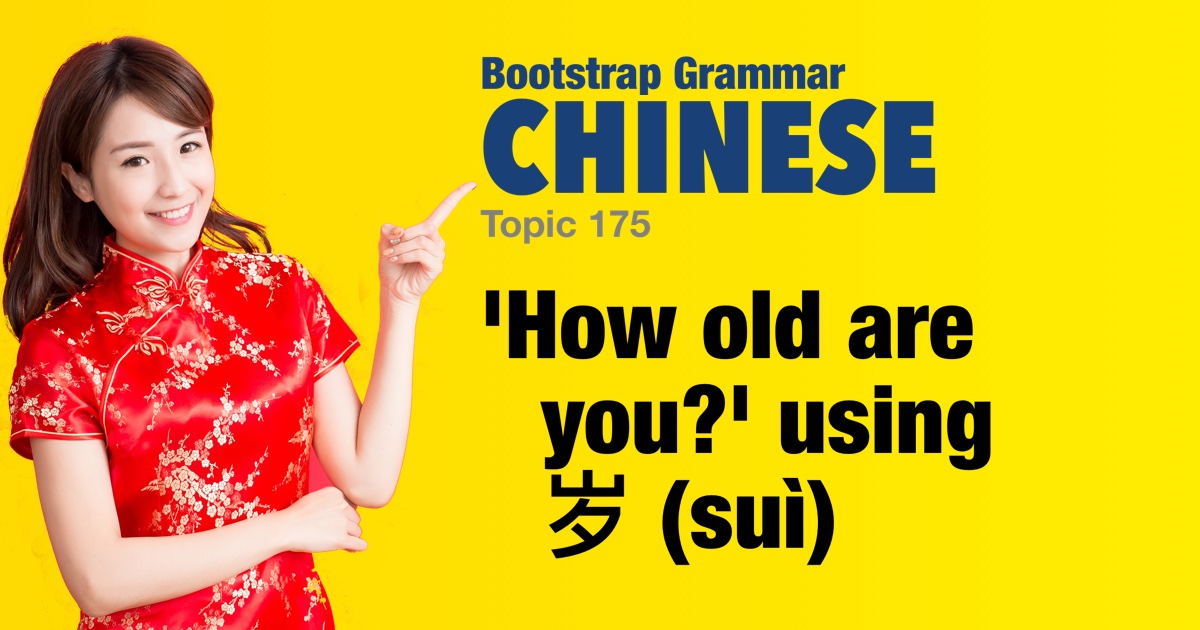Chinese grammar - 'How old are you?' using 岁 (suì) |
|||
|
|||
In Chinese, discussing age involves the measure word 岁 (suì), which means 'to be X years old' or 'to turn X years old'. The pattern is: [subject] + [number] + 岁 meaning '[subject] is [number] years old'. While the answer always uses the measure word 岁 as above, the question depends on the approximate age: • 你几岁?(nǐ jǐ suì?) for children under 10. • 你多大?(nǐ duō dà?) for adults and children over 10. • And 多大年纪 (duō dà niánjì) is the polite or respectful way to ask the age of older people. |
| Examples: | |
|
你几岁?
nǐ jǐ suì? How old are you?
|
|
|
你多大?
nǐ duō dà? How old are you?
|
|
|
我十岁。
wǒ shí suì. I am 10 years old. |
|
|
他才五岁。
tā cái wǔ suì. He is only five years old. |
|
|
她三十岁。
tā sānshí suì. She is 30 years old. |
|
|
你儿子几岁?
nǐ érzi jǐ suì? How old is your son?
|
|
|
你奶奶多大年纪?
nǐ nǎinai duōdà niánjì? How old is your grandmother?
|
|
|
他已经六十岁了。
tā yǐjīng liùshí suì le. He is already 60 years old. |
|
|
她的儿子快五岁了。
tā de érzi kuài wǔ suì le. Her son is almost 5 years old. |
|
|
我上个星期二十一岁了。
wǒ shàng ge xīngqī èrshíyī suì le. I turned 21 last week. |
|
|
她二十岁才开始工作。
tā èrshí suì cái kāishǐ gōngzuò. She didn't start working until she was twenty. |
|
|
他下个月五岁了。
tā xiàge yuè wǔ suì le. He will turn 5 next month. |
|
|
你什么时候十六岁?
nǐ shénme shíhou shíliù suì? When will you turn 16? |
|
|
你的哥哥看起来比二十五岁老。
nǐ de gēge kànqǐlái bǐ èrshíwǔ suì lǎo. Your brother looks older than 25 years old. |
|
|
虽然你十八岁,你还不能喝酒。
suīrán nǐ shíbā suì,#nǐ hái bù néng hējiǔ. Although you are 18, you cannot drink alcohol yet. |
|
|
即使她二十岁了,她还不会开车。
jíshǐ tā èrshí suì le,#tā hái bù huì kāichē. Even though she was 20 years old, she could not drive a car. |
|
|
你的哥哥看起来比二十五岁老。
nǐ de gēge kànqǐlái bǐ èrshíwǔ suì lǎo. Your brother looks older than 25 years old. |
|
 |
|


 For children under 10
For children under 10
